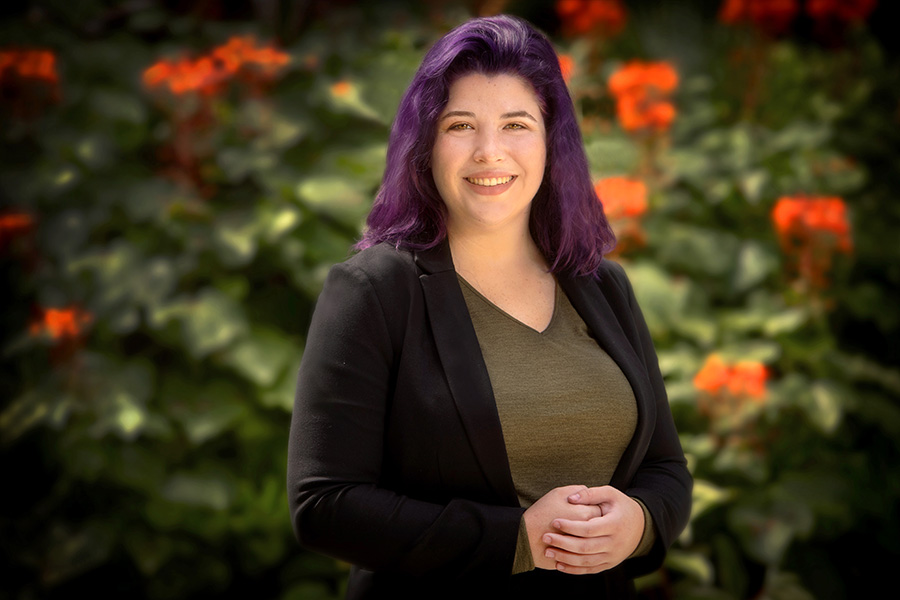
“I am so thankful that Florida State nurtures an environment for discovery and research for its students and staff.”
The first time Jenevieve Norton visited the Florida State University campus, she felt an immediate connection.
“I chose to attend FSU because of the academic and research opportunities available here,” she said. “I also believed I could build strong social and professional connections.”
Norton’s motivation comes from her family — education has always been highly encouraged.
“Watching my mother complete both her bachelor’s and master’s degrees while raising my siblings and me and holding a full-time job was inspiring,” said Norton, a senior from West Palm Beach, Fla.
Norton is a biology major with an interest in ornithology and animal behavior. She was drawn to FSU because of the research opportunities for undergraduate students, such as the Undergraduate Research Opportunity Program, which is designed to connect high-achieving first-year and second-year students with research projects led by faculty and doctoral students.
“I was so excited for the opportunity to take classes and partake in research so relevant to my interests to grow as a researcher and student,” she said.
Norton has worked in The DuVal Lab at FSU for more than two years, studying the lance-tailed manakin, a small tropical bird. She has researched the influence of the sense of smell on mate choice as well as nest-site fidelity in manakins. The hands-on work taught her a lot about studying animal behavior in an academic setting.
“I believe that understanding behavior is the key to solving problems such as species rehabilitation after habitat loss and interactions between species and their environments,” she said.
In Spring 2021, Norton received an IDEA Grant from the FSU Center for Undergraduate Research and Academic Engagement for her individual research in The DuVal Lab. With this grant, she traveled to Panama for six weeks to study manakins’ nest-site fidelity, a measure of how faithful the birds are to a specific nesting site.
“Before receiving the IDEA grant, I spent two years and hundreds of hours conducting research on a bird that I had never seen in person,” she said. “It was really rewarding to take everything I had learned and apply it in the field. It was one of my proudest moments at FSU.”
In addition to presenting her findings at the Presidential Showcase for Undergraduate Excellence, she will be giving a 12-minute talk at the Animal Behavior Society this month. She also has previously presented her research at the Research Experience Program Symposium for Women in Math, Science and Engineering (WIMSE).
“I am so thankful that Florida State nurtures an environment for discovery and research for its students and staff,” she said. “I have been able to accomplish as much as I have because of the various grants and programs available to students here.”
Since coming to FSU, Norton has been involved in many organizations such as the Learning-Living Community, WIMSE, Tri-Beta Biological Honor Society and the Environmental Service Program (ESP).
“Keeping up with classes, clubs and working in research was not easy to manage, even though I am passionate about everything I am involved in,” Norton said. “My most valuable lesson by far has been reaching out for help when I needed it.”
Since her sophomore year, Norton has worked with the Environmental Service Program on a variety of environmental projects — from tagging monarch butterflies and removing invasive plants to raising awareness of ecological issues in politics.
Through this program, she has helped educate the Tallahassee community on what sustainable living looks like and on environmental issues such as climate change and the decline of keystone species.
“ESP has allowed me to further my knowledge on topics I care about and make connections with others interested in the same causes,” she said.
Norton struggles with depression and anxiety disorders, but FSU has provided strong support that has helped her to thrive.
“In the times I felt like I was struggling, I was able to reach out to professors and advisers and find support at FSU,” she said. “Being open about mental health can be daunting and difficult, but during my time at FSU, I have found a supportive and understanding staff.”
After graduation, Norton plans to pursue graduate studies in either academic research or science communication.
“I plan on gaining more field experience before choosing which direction I want to go,” she said. “In my career, I hope to educate people about animals and continue to demystify animal behaviors in and out of my field.”




